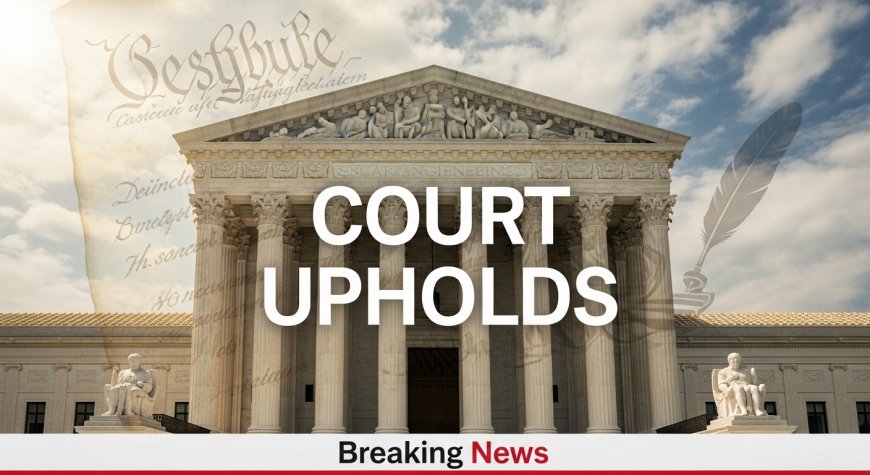BREAKING: Supreme Court Upholds Tennessee Law Banning Gender-Affirming Care for Minors
BREAKING: Supreme Court upholds Tennessee law banning gender-affirming care for transgender minors in landmark constitutional decision.

BREAKING: Supreme Court Upholds Tennessee Law Banning Gender-Affirming Care for Minors
WASHINGTON, D.C. - In a landmark 6-3 decision that will reshape transgender rights across the United States, the Supreme Court on June 18, 2025, upheld Tennessee's controversial ban on gender-affirming medical care for minors, marking the first time the nation's highest court has ruled on this contentious issue.
The Decision
Chief Justice John Roberts authored the majority opinion, joined by the court's conservative justices, concluding that Tennessee's SB 1 does not violate the Equal Protection Clause of the Fourteenth Amendment. The court's three liberal justices - Justices Sonia Sotomayor, Elena Kagan, and Ketanji Brown Jackson - dissented from the ruling.
The majority found that Tennessee had "plausible reasons" for restricting access to gender-affirming care, citing concerns about potential health risks to minors. This constitutional analysis brought the court's inquiry into the law's validity to an end, effectively giving states broad authority to regulate such medical treatments.
What the Tennessee Law Does
Tennessee's SB 1, which took effect in 2023, prohibits healthcare providers from:
- Prescribing hormone therapy to transgender minors
- Providing puberty blockers to minors seeking gender transition
- Performing gender-affirming surgeries (though this provision was not central to the case)
The law imposes civil penalties on doctors who violate these prohibitions, effectively ending most gender-affirming medical care for transgender youth in the state.
Constitutional Implications
This decision represents a significant departure from lower court rulings that had struck down similar laws on constitutional grounds. The Supreme Court's ruling establishes that states have substantial latitude in regulating medical care for transgender minors, even when such regulations may disproportionately impact LGBTQ+ individuals.
The majority opinion focused on the state's authority to regulate medical practice and child welfare, rejecting arguments that the law constituted discriminatory treatment based on transgender status.
Nationwide Impact
The ruling's impact extends far beyond Tennessee's borders. Currently, 24-27 states have enacted laws similar to Tennessee's ban, affecting thousands of transgender youth and their families across the country. This decision is likely to:
- Embolden other states to pass similar restrictions
- End ongoing legal challenges to existing bans
- Force families to travel across state lines for care
- Create a patchwork of access depending on geographic location
The Case Background
The lawsuit was brought by transgender children and their parents in Tennessee who argued that the state's ban violated their constitutional rights to equal protection and due process. The plaintiffs contended that the law discriminated against transgender youth and interfered with fundamental parental rights to make medical decisions for their children.
Lower courts had been divided on similar laws, with some federal judges blocking enforcement while others allowed the bans to proceed. The Supreme Court's decision resolves this circuit split definitively.
Reaction and Response
The decision has generated intense reactions from both sides of the debate:
Supporters of the ruling argue that states should have the authority to regulate medical treatments for minors, particularly when long-term effects remain under study. They view the decision as protecting parental rights and child welfare.
Critics of the decision warn that it will harm transgender youth by cutting off access to medically necessary care that major medical associations have endorsed. LGBTQ+ advocacy groups have called the ruling a devastating blow to transgender rights.
Medical Community Response
Major medical organizations, including the American Medical Association and the American Academy of Pediatrics, have previously supported access to gender-affirming care for transgender youth when appropriate. These groups maintain that such care, when properly administered, can be life-saving for young people experiencing gender dysphoria.
Legal Landscape Moving Forward
This decision fundamentally alters the legal landscape for transgender rights litigation. Future challenges to similar laws will face a much higher bar, as the Supreme Court has now established that such regulations can survive constitutional scrutiny when states articulate legitimate governmental interests.
The ruling is expected to influence pending cases in other circuits and may prompt legislative action in states that have not yet addressed this issue.
What's Next
With this constitutional question now settled at the federal level, the focus is likely to shift to:
- State-level political battles over new legislation
- Efforts to provide support and resources for affected families
- Potential federal legislative responses
- Long-term studies on the impacts of these policy changes
The decision marks a pivotal moment in the ongoing national debate over transgender rights and state authority, with implications that will be felt for years to come.
This is a developing story. Check back for updates as more information becomes available.
What's Your Reaction?
 Like
0
Like
0
 Dislike
0
Dislike
0
 Love
0
Love
0
 Funny
0
Funny
0
 Angry
0
Angry
0
 Sad
0
Sad
0
 Wow
0
Wow
0
































































